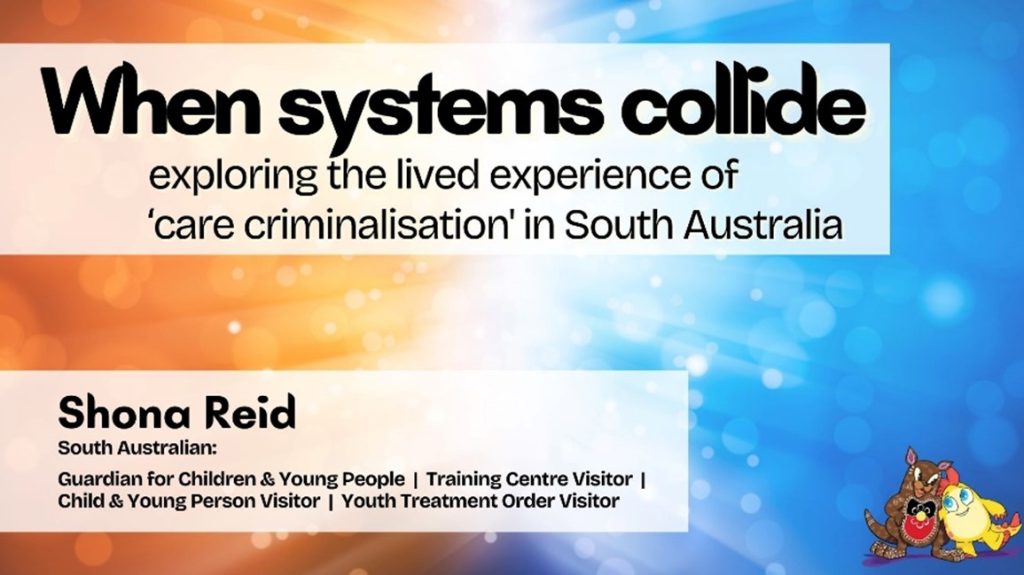
For those who attended the recent 5th Australasian Youth Justice Conference in Naarm (Melbourne), you may have seen Shona Reid presenting on her work supporting and promoting the voices of children and young people in care and detention.
With a theme of Strengthening Connections: The Power of Relationships and Strong Service Partnerships, the conference brought together advocates and decision makers from across Australia.
Shona’s presentation focused on ‘care criminalisation’ and exploring the voices of children and young people with lived experience.
The concept of ‘care criminalisation’ refers to the phenomenon where children in out-of-home care (such as foster care, or residential care facilities) are more likely to come into contact with the criminal justice system compared to their peers who are not in such care.
Did you know?
- Children in care account for only 1% of the child population in South Australia – 1 in 100 children
- One in three children and young people in youth justice detention are also in care
Children and young people in care have often been exposed to traumatic childhood experiences which can manifest in behaviours that are perceived as problematic or criminal. These behaviours are often misunderstood and mishandled with punitive responses applied to a wide range of unsuitable situations, rather than those of genuine necessity. This can result in over-criminalisation and disproportionate representation in youth detention – with serious consequences, including impacting emotional wellbeing, social development, educational prospects, and future opportunities.
When asked about the key message she hopes were taken away from her presentation, Shona said:
“Children and young people with care and detention experiences are the experts in this conversation. They are acutely aware of the care criminalisation phenomenon, and have significant insights to share about the causal factors and solutions to prevent this criminalisation. The conference brought together leaders in government agencies from across the country – and I do challenge them to champion necessary youth justice reforms in the best interests of children and young people.
In the past, I have observed governments approach discussions around care criminalisation with caution and even avoidance at times – seemingly afraid of any perception that the child protection system plays a role in the root cause of this phenomenon. Unfortunately, I have seen that this resistance result in a dichotomy of blame, with the narrative lending itself to pointing the finger at children and young people in care.
I would like to be clear: I do not find pinpointing causes through any one factor or another to be a useful framework for these discussions.
Care criminalisation has developed over generations, through firmly entrenched systemic and community responses to children and young people who have experienced separation from their families and, often, who have experienced significant individual and systems trauma.
The solutions to help children and young people in care break free of these statistics (or associations to statistics) does not lie within the walls of one department. The solutions lie in whole-of-government acceptance of responsibility and shared purposeful responses, beyond the limited scope of a child protection portfolio. This must extend across all systems interacting with vulnerable children and young people.”
Focusing in on solutions, Shona outlined just some of the strategies for reducing the criminalisation of children in out-of-home care. These reforms span across legislative changes, policy adjustments, and practice modifications within child welfare agencies and youth justice systems – and focus on creating more supportive, understanding, and rehabilitative environments, rather than punitive ones. This includes:
- Implementing trauma-informed care
- Enhancing training for caregivers and law enforcement
- Diversion programs
- Policy reforms in schools
- Legislative changes
- Improved collaboration between agencies and systems
- Reducing reliance on law enforcement
- Placement stability
- Post care support services
- Data collection and accountability
By implementing these reforms, decision makers, child protection agencies, and community leaders can work together to significantly reduce the criminalisation of children in out-of-home care and improve their life outcomes.
You can read the Guardian’s full presentation here.
